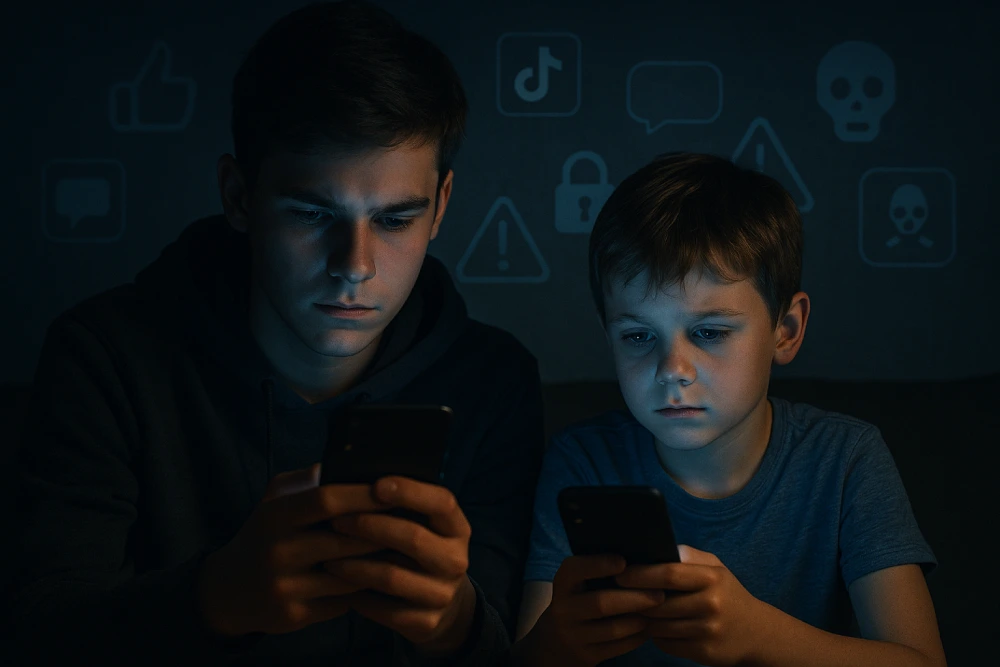
Children and teens use the internet every day. In 2024, nearly 90% of 12-year-old preteens1 used a smartphone. This profoundly changes how they learn, communicate and socialise. But use of the internet also poses risks to children.
And because our bilingual international school in Paris is fully aware of this, we explain how children use the internet, the major risks involved and our advice for preventing them.
Key Points
| Topic | Dangers/Risks | Advice |
| Video games | Cyberbullying, addiction | Limit gaming to 1-2 hours/day, choose non-violent games, activate safety filters |
| Social media | Exposure to inappropriate content, peer pressure | Activate privacy settings, speak to your child regularly |
| News media | Fake news, conspiracy theories | Verify news sources, encourage critical thinking |
| Artificial intelligence and chat bots | Misuse, ethical risks | Monitor interactions, educate on privacy |
| Instant messengers | Identify theft, cyberbullying | Activate safety filters, do not share sensitive information |
| Streaming and video content platforms | Extended exposure to screens, inappropriate content | Limit daily viewing time, activate content filters |
| Educational apps and tools | Screen addiction | Limit use to 1-2 hours/day, activate parental controls |
| Online shopping and consumption | Undesirable purchases, misleading sales practices | Activate parental controls, talk about advertising risks |
| Cyberbullying | Online bullying, aggression | Report to police and platforms, encourage transparency with children |
| Protection of personal data | Abusive collection of personal data | Activate privacy settings, explain the importance of personal data |
| Digital identity theft | Fraud, identity theft | Do not share login information, use 2-factor authentication |
Understanding Internet Risks for Children
Today, children and teens use many online tools every day, including smartphones, tablets and computers. They use many different platforms, from social media to online games. Here are the dangers that children are exposed to online and the risks associated with these platforms.
Video Games
Online games are extremely popular with young people: 54%2 of children under 13 play Roblox, girls and boys alike. Other popular games like Brawl Stars (34%) and Fortnite (31%) encourage virtual socialisation, but can also expose children to cyberbullying and addiction.
We advise: limiting gaming to 1-2 hours per day, choosing non-violent games and activating safety filters to restrict interactions with strangers. Schedule offline time to limit screen time.
Social Media
Although social media is prohibited for children under 13, 75% of 11 and 12-year-olds3 use at least one social network. TikTok, Instagram, Snapchat and YouTube are their favourite platforms. They share photos, videos and comments. Most children secure their profiles, keeping them private (79%). However, they are still exposed to inappropriate content, such as violence and sexuality, as well as peer pressure regarding appearance and popularity online.
We advise: do not allow children under 13 to use social media, in accordance with the law. Activate privacy settings to protect your children’s personal data. Speak with your child regularly about their activities online to teach them about the associated risks.
News Media
YouTube, Twitch and other streaming platforms give them easy access to news and culture. This opens them to new ideas, but also exposes them to online risks. Teaching them critical thinking is essential for protecting them from fake news and conspiracy theories.
We advise: help your child verify news sources and encourage critical thinking. Talk about the news together on a regular basis to help them distinguish between reliable and misleading information.
Artificial Intelligence and Chat Bots
Under-13s do not yet widely use artificial intelligence tools like ChatGPT. Three-quarters of children have never used this kind of technology, while 17%4 have only used it occasionally. However, their increasing popularity means we should remain vigilant and educate our children on how to use them safely and intelligently.
We advise: monitor your child’s interactions with these tools and talk about the ethical issues of using AI. Help them understand the importance of privacy and responsible use of these technologies.
Instant Messengers
Apps like WhatsApp, Snapchat and Messenger allow children to chat privately or in groups. Although they facilitate communication, they expose children to risks of identity theft, cyberbullying and uncontrolled content sharing.
We advise: activate privacy settings to limit interactions with strangers and make sure your child doesn’t share sensitive personal information.
Streaming Platforms and Video Content
Services like Netflix, YouTube and Amazon Prime provide access to a variety of enriching and educational video content the majority of the time. But they can also lead to prolonged exposure to screens and risks related to inappropriate content.
We advise: limiting daily screen time and activating content filters to restrict access to inappropriate videos. Encourage your child to take regular breaks.
Educational Apps and Tools
Digital educational tools greatly facilitate learning and collaboration. But use must be monitored to prevent screen addiction.
We advise: limiting use of these tools and encouraging breaks.
Online Shopping and Consumption
Children are increasingly confronted with targeted ads and integrated purchases, particularly in video games. These can lead to undesirable purchases or misleading sales practices.
We advise: activating parental controls to limit in-app purchases. Also talk to your child about the risks of online ads. Encourage them to remain vigilant and ask your permission before making a purchase.
The Law, Children and the Internet
It is important to understand what the law says about online tools, particularly for protecting children from the dangers of the internet. The law regulates cyberbullying, protection of personal data and digital identity theft. These are the main offences and legal protections that parents and children should be aware of to keep internet use safe.
Cyberbullying
Cyberbullying is defined by repeated acts of harassment or aggression through digital tools, such as social media, online games and instant messengers. It can take various forms, such as threats, ridicule, insults or diffusion of humiliating content. French law strongly condemns cyberbullying, with sanctions ranging from fines to prison time, depending on the seriousness of the crime.
We advise: Report all cyberbullying to the police or directly on the platform in question. This will help protect your child and make sure the perpetrators are prosecuted. As a parent, encourage your child to tell you immediately if they feel harassed online.
Protection of Personal Data
Protection of personal data is an essential aspect of internet use, especially for children. The law requires platforms to follow strict rules regarding the collection and processing of minors’ personal data. Parents must remain vigilant and educate their children about the importance of protecting their data online.
We advise: make sure that the privacy settings are activated on your children’s accounts. And be sure that they share only essential information. Explain the importance of not divulging sensitive information online, such as their address or banking information.
Digital Identity Theft
Digital identity theft means stealing someone’s identity online by creating a fake profile or accessing personal information. The goal is to create harm or commit fraud. This phenomenon is particularly worrisome for children, who can be more vulnerable to this type of attack. Digital identity theft is a serious offence. It is severely punished by French law to protect victims of fraud and online abuse.
We advise: teach your child never to share login information and confirm the authenticity of requests online. Encourage them to use complicated passwords and activate 2-factor authentication on their accounts.
Best Age-Appropriate Practices for Protecting Children from Online Risks
From our bilingual preschool in Paris to our middle school in Paris 16, digital education must be adapted to the age and needs of each child. This is because young internet users are exposed to specific risks depending on their age and level of maturity.
Ages 3-6
At this age, screen use must be very limited and under constant supervision. Games and physical interaction must be prioritised, away from screens.
We advise: limiting screen time to less than 30 minutes per day and selecting quality educational apps. Always be with your children when they use digital tools and explain the basics of online safety in a simple way.
Ages 6-12
Children begin to use digital tools for education and fun. They are curious and can access inappropriate content. Monitoring them is essential.
We advise: activating content filters on the devices your children use and setting up parental controls. Limit screen time to 1-2 hours per day and encourage breaks. Explain clearly why certain information and content must be avoided.
Ages 12 and Up
Teens have more freedom online, particularly for social media and online games. It is essential to maintain open communication to tackle risks proactively.
We advise: instilling transparency by asking your teen to let you know if they encounter a problem online. Discuss the specific dangers of social media, cyberbullying and privacy online. Encourage them to use privacy settings and think carefully about which information they share.
The internet is a key part of daily life for children. And it undeniable opportunities for learning and socialisation. However, it exposes children to online risks of which parents must be fully aware.
At our international school in Paris, we care about educating our students on intelligent and safe use of new technology. Because we believe that responsible digital education, a part of active parenting, is essential for preparing young people to navigate the digital world safely.

